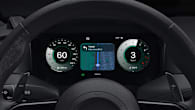Q: What is the average fuel consumption for cars?
A: Like any mathematically derived average, average fuel consumption is a great way to compare the relative efficiency of different makes and models.
Looking at a single fuel consumption figure might give you part of the picture, but a set of average consumption figures covering different cars is a great basis on which to make a comparison.
Of course, what most people want is a guide to the average consumption figure they should be achieving, and how that compares to other models.
Because there’s a huge difference in the average fuel consumption per 100km between cars, SUVs and light commercial vehicles, there are no hard and fast rules on this subject.
However, as a rule of thumb, a small city hatchback should be able to achieve an average fuel consumption of around six to seven litres per 100km, a mid-sized SUV will be closer to eight or nine litres per 100km and a full-sized family SUV will use closer to 10 litres per 100km in the real world.
Something like a dual-cab, four-wheel drive ute – even though it has a diesel engine – is also likely to be around the 10 litres per 100km mark.
Hybrids skew those figures even more and also buck the trend by actually having lower fuel consumption in an urban setting than they do on the highway, the total opposite of conventional cars.
And a plug-in hybrid can, if you stick to trips within its electric range and charge it up frequently, use very little fuel over the space of a year.
.jpg)
Another factor that will have a huge effect on a car’s average fuel consumption is the way it's driven. A driver with a light right foot will stretch each litre further, so identical cars with different drivers will often have very different average fuel consumption numbers.
Knowing how to work out average fuel consumption is no trade secret, it’s a very simple mathematical formula.
Essentially, you divide the amount of fuel you know you’ve used (the fuel pump at the service station will tell you this) by the distance you’ve travelled on that fuel (you need to have reset the trip computer when you previously filled up).
From there it’s a simple litres used divided by distance travelled. Because average (avg) fuel consumption is typically expressed in Australia as litres per 100km, you need to divide the distance by 100 and use that number to then divide the number of litres.
.jpg)
This formula works for every type of fuel, from petrol, to diesel and gas (LPG). So here’s how it works:
For example, let’s say you’ve travelled 620km since you last filled up, and you needed 53 litres to fill up. So, by dividing 53 (litres) by 6.2 (620km divided by 100) you can calculate that your average fuel consumption for that last tank was 8.5 litres per 100km.
You can also flip this formula around to show your fuel consumption in kilometres per litre (which is easier to understand for some people).
In that case, you divide the distance travelled by the litres used. So, in our example, that means 620km divided by 53 litres to arrive at 11.7 km per litre.
The greater the distance you can use and the more fill ups you can include will give you a much more accurate idea of the total, overall fuel consumption of the vehicle as opposed to just a single tankful that may only represent one long trip.
By keeping records of distances and fill-ups, you can calculate your fuel use over months and even years to get a really good idea of how much fuel you use on average.






.jpg)
.jpg)
.jpg)




 copy.jpg)


_0.jpg)
.jpg)

.jpg)





.jpg)

